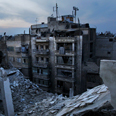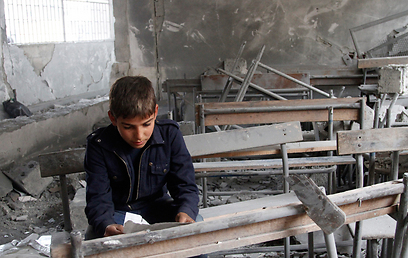
A mortar slammed into a ninth-grade classroom in the Damascus suburbs on Tuesday, killing 29 students and a teacher, according to state media, as the civil war closed in on President Bashar Assad's seat of power.
The state-run news agency SANA blamed the attack on terrorists, the term the regime uses for rebels who are fighting to topple the government.
Related stories:
- Heavy fighting near Syrian capital
- Syria: Twin car bombs in Damascus kill 34 people
- Syrian opposition says may allow peacekeepers if Assad goes
The mortar hit the al-Batiha school in al-Wafideen camp, about 15 miles northeast of Damascus, according to SANA.
The camp houses 25,000 people displaced from the Golan Heights since the 1967 war between Syria and Israel.
"It's a terrorist attack on educational institutions and on students," Hassan Mohsen, the director of Quneitra Education Department, said. Further details were not immediately released.

A school damaged by Assad's forces (Archives: AP)
The bloodshed comes as Syrian forces fired artillery at rebel targets in and around the capital and the international community grew increasingly alarmed about the regime's chemical weapons stocks.
Syrian rebels have made gains in recent weeks, overrunning military bases and bringing the fight to Damascus.
Since Thursday, the capital has seen some of the heaviest fighting in more than four months, killing scores of people, forcing international flights to turn back or cancel flights and prompting the United Nations to withdraw most of its international staff.
"The push to take Damascus is a real one, and intense pressure to take control of the city is part of a major strategic shift by the rebel commanders' strategy," said Mustafa Alani, a Middle East analyst from the Geneva-based Gulf Research Center. "They have realized that without bringing the fight to Damascus, the regime will not collapse."
US intelligence has detected signs the regime was moving chemical weapons components around within several sites in recent days, according to a senior US defense official and two US officials.
The activities involved movement within the sites, rather than the transfer of components in or out of various sites, two of the officials said.
But this type of activity had not been detected before and one of the US officials said it bears further scrutiny.
NATO Secretary-General Anders Fogh Rasmussen warned Tuesday that "if anybody uses chemical weapons, I would expect an immediate reaction from the international community."
Syria is believed to have hundreds, if not thousands, of tons of chemical agents, including mustard gas, a blistering agent, and the more lethal nerve agents sarin and VX, experts say.
Syria is party to the 1925 Geneva Protocol banning chemical weapons in war.
- Receive Ynetnews updates
directly to your desktop















